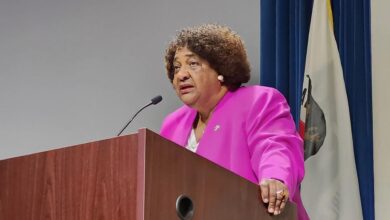After Severe Storms Kill 12, State Warns of Ongoing Dangers

By California Black Media

In Los Angeles, homeless encampments are bulldozed by the storm leaving its inhabitants wet and without shelter. (Kenneth Miller/ South Bay Black Journal)
State authorities and elected officials around California are thanking 8,500 first responders for their combined efforts over the past weeks to save lives during severe storms that killed 12 people, contributed to intense flooding, led to power outages, downed trees and caused more than $10 million in damages.
They are also directing Californians to resources to address losses they may have suffered during the storms and warning them of ongoing dangers.
“We mobilized an all-of-government response, including our swift water rescue teams that have made 47 rescues,” said Gov. Gavin Newsom. “We’re grateful to our thousands of first responders who have saved countless lives and kept our state going in the face of record-breaking rainfall and snow.”
On Feb. 4, the Governor declared a state of emergency in eight counties: Los Angeles, Ventura, Orange, San Bernardino, San Luis Obispo, Santa Barbara, Riverside and San Diego.
On Feb. 7, Newsom followed up by requesting a major disaster declaration from the White House to support San Diego County as it recovers from the storms.
“The late January storm saw record-breaking rain in San Diego, where the worst impacts were felt in lower-income neighborhoods. Many folks saw damage to their life’s work that can’t be recovered without federal support,” the Governor said.
On Feb 10, the Governor’s Office for Emergency Services (CalOES) provided safety tips for returning home aimed at Californians who had to evacuate, including how to deal with accumulated muck, mud and debris.
In Sacramento County, a 63-year-old woman was found dead under a large fallen tree in her backyard.
Effects of recent storms can weaken trees, leading to falling branches or even entire trees, which can cause damage to homes, and vehicles and pose a threat to public safety, according to Cal OES.
The sudden occurrence of toppled trees, fallen branches or uprooted trees saturated by standing water creates hazardous conditions for pedestrians, motorists, power lines, and homes.
CalOES is urging Californians to stay informed about whether forecasts, and informed the public that it is still assessing storm damages.




